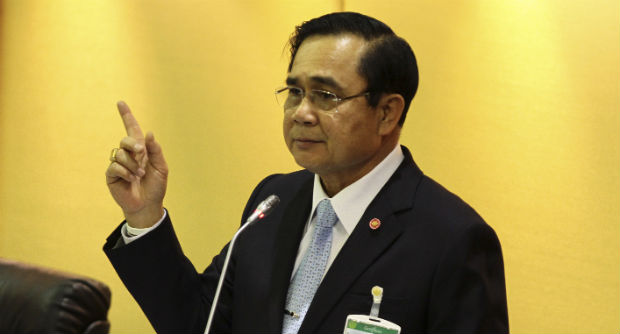
National Council for Peace and Order Chairman Gen. Prayuth Chan-ocha talks to members of the National Legislative Assembly at the Parliament in Bangkok, Thailand Monday, Aug. 18, 2014. AP
BANGKOK, Thailand— Three months after overthrowing Thailand’s last elected government, this Southeast Asian nation’s junta leader is poised to step out of his army uniform for good — to take up the post of prime minister in a move critics say will only extend his time at the helm and consolidate the military’s grip on power.
The legislature, hand-picked by the junta and dominated by active duty soldiers, is expected to hold a vote in Bangkok on Thursday nominating Gen. Prayuth Chan-ocha to the new role.
The 60-year-old Prayuth is due to retire from the armed forces next month and the change appears aimed in part at ensuring stability and continuity as the military implements sweeping political reforms in the months or possibly years.
Pavin Chachavalpongpun, a Thai professor of Southeast Asian studies at Kyoto University, said those reforms are designed to purge the influence of the former ruling party and favor an elite minority that has failed to win national elections for more than a decade.
Prayuth’s new posting will do little to change the status quo since the May 22 coup, with power remaining firmly in the junta’s hands. Prayuth has effectively served as de facto premier since then.
“He could have refused the job, but what would be the point?” said Pavin, who has been critical of the new regime. After he refused to respond to a junta summons ordering him to return home and report to the army, the junta revoked his passport.
Thursday’s National Legislative Assembly vote is the latest in a series of moves by the junta to consolidate power on its own terms. In July, the military adopted a temporary 48-article constitution. The junta then appointed the assembly a couple weeks later.
Earlier this week, Prayuth appeared at Parliament to approve the next fiscal year’s budget; he was dressed for the first time in public in a business suit, an apparent signal he was readying for the new job.
Prayuth’s nomination requires a simple majority vote in Parliament. It must then be approved by King Bhumibol Adulyadej, a formality likely to occur within a week. Prayuth will then name a new Cabinet.
Thailand has not had a prime minister since caretaker premier Niwattumrong Boonsongpaisan’s government was ousted in the May coup.
Niwattumrong held the position only briefly to replace Prime Minister Yingluck Shinawatra, who took office after a landslide 2011 election. Yingluck was removed from office for nepotism in a court case her supporters say was politically motivated; she has kept an intensely low profile since the coup, part of a vast coterie of politicians who have been forced into silence.
Thailand has been deeply divided since 2006, when former Prime Minister Thaksin Shinawatra — Yingluck’s brother — was toppled in an earlier army coup after being accused of corruption, abuse of power and disrespect for Bhumibol.
RELATED STORIES